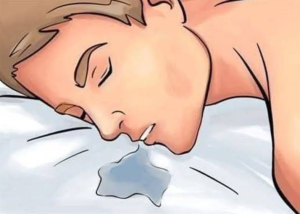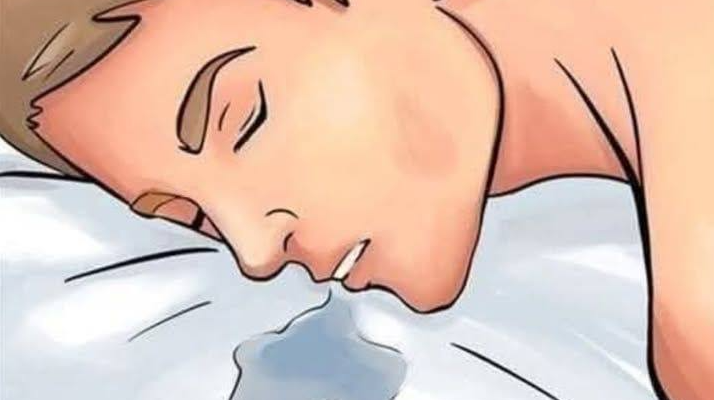
If you’ve ever woken up to find a little puddle of drool on your pillow, you might feel a mix of embarrassment and confusion. But here’s the interesting part — that simple, seemingly gross habit might actually be telling you something about your body and your brain. Drooling in your sleep, medically called sialorrhea, is more common than most people realize. And in many cases, it’s not a sign that something is wrong — quite the opposite. It can be a small but fascinating clue that your cerebral activity and body functions are in healthy balance.
When we sleep, our brain cycles through several stages — from light sleep to deep sleep and rapid eye movement (REM) sleep. During the deepest stages, your muscles relax completely, including those in your face and jaw. This relaxation sometimes causes your mouth to open slightly. At the same time, if you’re in a very deep or comfortable stage of sleep, your swallowing reflex may slow down. That’s when saliva, which your body keeps producing even while you rest, can pool in your mouth and escape through the corners of your lips. When you wake up to a damp pillow, it usually means you were in deep, restorative sleep — the kind your brain needs for memory formation, emotional processing, and physical recovery.
In that sense, drooling can be a sign that your brain and body are achieving genuine relaxation. People who sleep restlessly, wake up often, or struggle with sleep disorders rarely experience drooling, because they don’t stay long enough in those deep stages. So, if you occasionally wake up with drool, it might indicate that your brain entered the most regenerative phase of sleep — something many adults don’t experience as frequently as they should.
Of course, drooling can also be influenced by sleeping position. Those who sleep on their stomach or side are more likely to drool simply because gravity helps saliva escape from the mouth. Back sleepers, on the other hand, tend to swallow it naturally. But even beyond posture, drooling is often linked to how relaxed your nervous system is. The brainstem, which controls basic functions like breathing and swallowing, becomes less active during deep rest. That’s not a flaw — it’s a sign that your body feels safe enough to let go completely.
However, there are times when excessive drooling might point to an underlying issue. Certain medications, allergies, or nasal congestion can cause you to breathe through your mouth more, leading to increased saliva flow. In rare cases, neurological conditions such as Parkinson’s disease or stroke can affect the muscles responsible for swallowing and saliva control. But those cases are usually accompanied by other clear symptoms. For most healthy people, drooling is benign and even beneficial.
Interestingly, some studies have shown that drooling can correlate with the quality of REM sleep — the stage where your brain processes emotions, dreams, and long-term memories. In other words, if you’ve been under stress and your brain finally gets a chance to relax deeply, you might drool more. It’s your body’s way of showing that you’ve reached a truly restful mental state.
From a neurological point of view, the cerebrum and brainstem work together during sleep to balance muscle tone, saliva production, and reflexes. If those systems are communicating smoothly, it often results in steady breathing, relaxed muscles, and deeper rest — all factors that can make drooling more likely. So yes, in a way, drooling can be interpreted as a sign that your cerebral activity is functioning properly. Your brain is transitioning efficiently between sleep stages, and your nervous system isn’t hyperactive or stressed.
It’s also worth noting that drooling becomes more common when your body is well-hydrated. Dehydration can make saliva thick and sticky, reducing the likelihood of drooling. So waking up with drool might even suggest your hydration and metabolism levels are balanced — another subtle indicator that your body’s internal systems are working in harmony.
For people who drool frequently or excessively, small lifestyle adjustments can help. Sleeping on your back, elevating your head slightly, and treating nasal congestion are simple ways to reduce saliva leakage. If drooling is accompanied by snoring, gasping, or fatigue, it could be worth talking to a doctor about possible sleep apnea. But again, in most cases, drooling is harmless and natural — a quiet signal that your mind and body have reached true rest.
The next time you wake up with a bit of drool on your pillow, don’t rush to feel embarrassed. Instead, take it as a small compliment from your body — a sign that your brain has slowed down enough to recharge, your muscles have fully relaxed, and your sleep cycle has done its job. In a world where so many people struggle with insomnia, restlessness, and overactive thoughts, drooling can actually mean you’re one of the lucky ones who can still find deep, genuine sleep.
So, while the sight might not be glamorous, it’s a quiet message from your nervous system: your cerebral processes are balanced, your stress levels are low, and your body feels safe. Drooling, in that sense, is a natural badge of restfulness — a small reminder that your brain still knows how to fully let go, heal, and dream.

